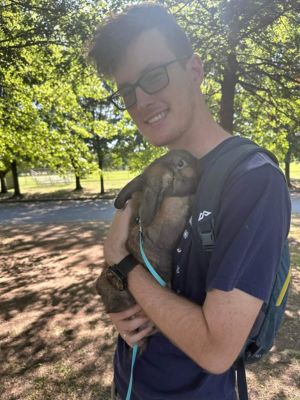How to Take Care of Baby Bunnies with a Mom
Hey there, I’m Chondon, a rabbit lover. If you’re a new rabbit owner and suddenly your rabbit gives birth to little babies, it’s a really exciting moment for every rabbit owner.
But it also increases the responsibility to take care of the baby bunnies with their mother. So in this article, I’m going to tell you how you can take care of the babies and their mother.
Let’s begin.
First Things First: Hands Off!
When I first saw Rupa give birth, I was so excited I wanted to check on the babies immediately. But there’s an important point: do not handle newborns.
Mother rabbits become very protective, and too much interference by humans may stress them out.
Knowing that the mother rabbit only nurses her babies once or twice a day, you don’t have to worry that she is neglecting her litter. It’s simply how nature designed them.
So if you don’t see the mom with her babies often, don’t worry—she’s doing exactly what she should.
Building a Safe Nesting
Of course, baby bunnies require a warm, quiet place to grow. Listed below are what you can do:
1. Provide a nest if the mother has not already made one.
2. Keep the area draft-free and away from direct sunlight.
3. Maintain a comfortable temperature— not too hot, not too cold.
For Rupa’s nesting setup, I just use a cardboard box lined with a bit of soft hay. They really love those! Just remember to make sure whatever you provide is clean and free from farm chemicals.
Feeding Time
In most cases, the mother rabbit will take care of feeding her babies. Her milk is perfectly formulated for their needs. But how can you tell if the babies are getting enough to eat?
Look for these signs:
- Plump, round tummies
- Active and squirmy when awake
- Steady weight gain
If you’re worried that the babies aren’t getting enough milk, don’t assume. Watch carefully for a day or two. If they seem weak or if their skin has a wrinkly appearance, then you need to feed the baby rabbits.
Water and Food for Mom
When the babies are dependent on their mother’s milk for all of their nutrition, it’s crucial to ensure that the mother rabbit has plenty of food and water because she’s working overtime to produce milk for the babies.
This is what I do for my nursing rabbit moms:
- Provide fresh, clean water at all times
- Offer plenty of high-quality hay
- Give her some leafy greens and a small amount of pellets
Just remember to keep the diet healthy. Too many treats will give her an upset tummy, which is no good for her and the babies.
Monitoring Health
Baby rabbits grow really fast! You can almost watch them grow. But it’s also important to keep an eye out for any health issues. Here are some things to check for:
- Eyes open at about 10 days old
- Fur starting to grow in
- Beginning to hop around at about 2 weeks
If you notice babies seem lethargic, aren’t growing, or have red eyes or runny noses, then it’s time to call the vet.
The Weaning Process
In a blink of an eye, these pink little babies become fluffy little rabbits ready to go out into the world. Weaning generally starts between 3-4 weeks of age. You will notice them trying to eat mom’s food. That’s OK!
At this Stage:
- Offer small quantities of hay and pellets
- Gradually introduce more solid food as they drink less milk
- Always provide fresh water
Socializing Baby Bunnies
Once the babies are about 3 weeks old, you can start gently handling them. This helps them get used to humans. Always wash your hands before and after handling them, and keep sessions short at first. Here are some tips on socializing:
- Let them come to you
- Massage gently and scratch
- Speak softly to them
Preparing for Independence
As the babies grow, they’ll need more space. At approximately 6-8 weeks, they’ll be ready to leave their mom. It is now that you have to make a decision: are you going to keep them or find them some nice homes?
If keeping them, then you’ll need:
- Housing for males and females separately in case you do not intend to let them breed
- Many toys and play space
- A plan for spaying or neutering when they’re old enough
Finding Good Homes
If you can’t keep all the babies, it’s important to find good homes for them. Make sure to:
- Screen potential owners carefully
- Provide information on proper rabbit care
- Offer support and advice even after the bunnies have gone to their new homes
Final Thought
Caring for baby bunnies and their mother is a rewarding experience that requires patience, attention, and knowledge. From providing a safe nesting environment to ensuring proper nutrition for the mother, monitoring the babies’ health, and guiding them through weaning and socialization, every step is crucial in raising healthy and happy rabbits.

Chondon Sarker, known as the Bunny Guru, is a passionate rabbit owner with over 10 years of experience. He has three pet rabbits and has gained extensive knowledge in rabbit behavior, health, nutrition, and housing. Chondon aims to share his expertise to help other rabbit lovers provide the best possible care for their furry friends.
